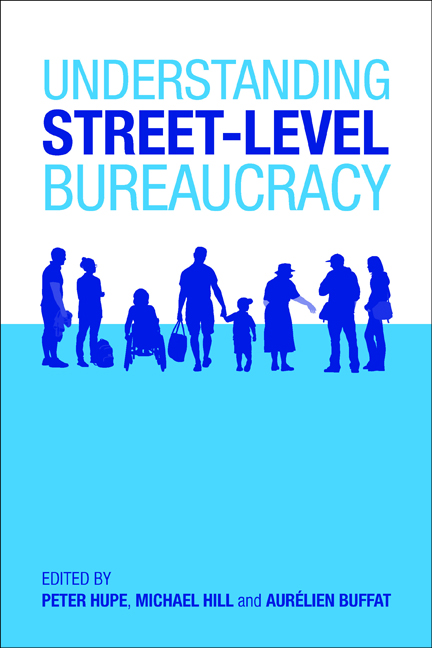Book contents
- Frontmatter
- Contents
- Biographical notes
- Preface
- Part One Introduction
- Part Two Delivering services and benefits: street-level bureaucracy and the welfare state
- Part Three Agents of the state: street-level bureaucracy and law enforcement
- Part Four Embedded in society: street-level bureaucrats as public actors
- Part Five The management of street-level bureaucrats
- Part Six The promise of professionalism
- Part Seven Conclusion
- References
- Index
Eighteen - Conclusion the present and future study of street-level bureaucracy
Published online by Cambridge University Press: 08 March 2022
- Frontmatter
- Contents
- Biographical notes
- Preface
- Part One Introduction
- Part Two Delivering services and benefits: street-level bureaucracy and the welfare state
- Part Three Agents of the state: street-level bureaucracy and law enforcement
- Part Four Embedded in society: street-level bureaucrats as public actors
- Part Five The management of street-level bureaucrats
- Part Six The promise of professionalism
- Part Seven Conclusion
- References
- Index
Summary
Introduction
The object of this volume has been to explore the nature of the accumulated knowledge of street-level bureaucracy. In this concluding chapter, we review the contents of the book and make a case for further research. Some authors speak of ‘street-level bureaucracy theory ’ (Maynard-Moody and Portillo, 2010). Indeed, since the publication of Michael Lipsky's (1980) book, the literature on street-level bureaucracy has developed in such a way that it offers a basis for the formulation of propositions that may be used to further understand and explain real-world phenomena, in a comparative perspective. Whether these propositions are called hypotheses depends upon one's stance on social science epistemology. The ever-present split between interpretivist and positivist orientations implies that the picture is mixed – as this volume shows. Knowledge and insights have been gained, in varying directions. ‘Theory’ (without an indefinite article) is used as an umbrella term for various sorts of contributions to street-level bureaucracy as a scholarly theme, where it would be inappropriate to speak of a theory.
With a variety in conceptualisations, research designs and epistemological stances, the state of knowledge on street-level bureaucracy can be characterised as one of multiple diversity. Against this background, we have tried to bring researchers together with respect to their shared interest in studying the subject matter central in this scholarly field. Some of the preceding chapters report on empirical analyses, while other are centred on concepts. The latter may assist us with the explanation or at least description of phenomena but do not necessarily lend themselves readily to hypothesis formation. In our view, this fact reflects the state of knowledge. The analyses of the phenomena in question are also influenced by normative concerns, summed up loosely as questions about ‘who should be in charge’ of policy outputs.
Therefore, in the next section, we go back to the book chapters and ‘interrogate’ them with respect to the aspects mentioned at the end of our introductory chapter, that is: the central question asked; theory and method; and the programmatic elements.
What do we learn: key issues and findings
Delivering services and benefits: street-level bureaucracy and the welfare state
After the introductory chapters, two parts of the book reflect a distinction between sorts of street-level bureaucracies as involved, respectively, in delivering services and benefits and in law enforcement.
- Type
- Chapter
- Information
- Understanding Street-Level Bureaucracy , pp. 315 - 338Publisher: Bristol University PressPrint publication year: 2015



